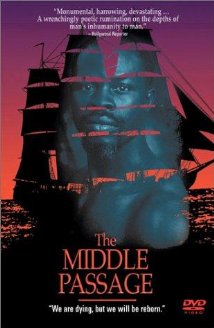The Middle Passage (French: Passage du milieu) is a 2000 docudrama film directed by Guy Deslauriers about the trans-Atlantic voyage of black slaves from the West Coast of Africa to the Caribbean, a part of the triangular slave trade route called the Middle Passage. It portrays the transportation of slaves from Senegal to the sugar plantations of Martinique and the miserable and often fatal conditions on board the slave ship. The script is by Patrick Chamoiseau based on a scenario by Claude Chonville.[1][2] It was a Martinique-Senegal-France co-production and was screened at the 2000 Toronto International Film Festival.[3]
| The Middle Passage | |
|---|---|
 | |
| French | Passage du milieu |
| Directed by | Guy Deslauriers |
| Screenplay by | Patrick Chamoiseau |
| Story by | Claude Chonville |
| Produced by | Yasmina Ho-You-Fat |
| Starring | Maka Kotto |
| Cinematography | Jacques Boumendil |
| Edited by | Aïlo Auguste |
| Music by | Amos Coulanges |
| Distributed by | Les films du Raffia |
Release dates |
|
Running time | 85 minutes |
| Countries | Martinique, Senegal, France |
| Language | French |
The film has no dialogue, only a voice-over, spoken by Maka Kotto.[2][3] Visually, it presents disconnected, slow-motion views of the slaves to evoke both their suffering and the resistance it produced, the source of the blues[2] and of West Indian identity.[4] When it was generally released in February 2001, the reviewer for La Libération said that it successfully occupied a territory "somewhere between the fiction of phantoms and the documentary of fantasies".[5] The reviewer for Le Monde judged it "a brave but ultimately unsuccessful attempt" to fill the "[cinematic] void" on this subject.[6]
See also
editReferences
edit- ^ "Le Passage du milieu: entre hommage et justice", Afrik.com, 23 February 2001 (in French)
- ^ a b c Philippe Azoury, "Contre le black-out", La Libération, 14 February 2001 (in French)
- ^ a b Peter Howell, "Film festival returns to African roots", Toronto Star, August 20, 2000.
- ^ "Mahogany March - Carte blanche à Leonora Miano au musée Dapper" Archived 2013-11-11 at the Wayback Machine, RFI, 30 January 2012, revised 20 February 2012 (in French)
- ^ Azoury: "Passage du milieu se situe donc quelque part entre la fiction fantomatique et le documentaire fantasmatique. Ce qui lui va plutôt bien."
- ^ Thomas Sotinel, "Ressusciter les images de la traite négrière", Le Monde, 14 February 2001 (in French): "Une tentative courageuse mais inaboutie ... de combler ce vide".
External links
edit- Passage du milieu. Les films du Raffia.
- The Middle Passage at IMDb